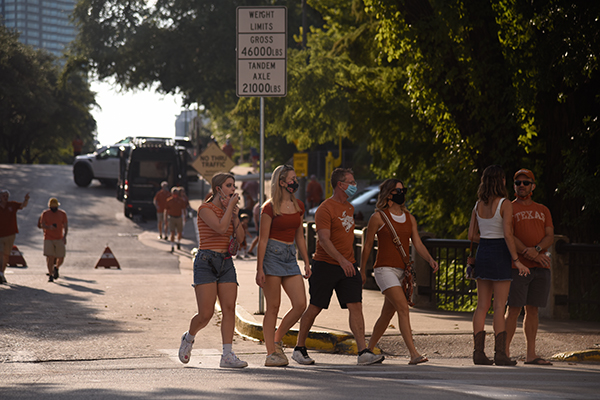UT-Austin enforced six out of 10 COVID-19 safety plan provisions at the football season opener versus UT-El Paso, according to a recent report released by Austin Public Health.
According to the report, UT went to “considerable lengths” to implement COVID-19 control measures, including testing students prior to the game, limiting capacity to less than 25%, cancelling Bevo Boulevard, prohibiting mobile food vendors, having concessionaires submit compliance plans and prohibiting tailgating.
Game attendance was below 25% during the Sept. 12 game, with 15,337 fans sitting in the 100,000-seat Darrell K Royal-Texas Memorial Stadium. However, mask wearing, social distancing and on-site sanitation were inconsistent, according to the report.
APH was unable to determine if concession employee temperatures were taken.
APH officials have seen indications that the first football game is connected to some case clusters, while a University spokesperson said UT contact tracers have seen no evidence of transmission among students, according to previous reporting by The Daily Texan.
APH observed that food staff did not change gloves between customers and did not observe sanitation of payment station screens, according to the report.
“The high-touch surfaces such as handrails and tables were not being regularly cleaned
throughout the game,” the report said. “This was also confirmed by discussing it with an on-site UT custodian staff member.”
APH took three random samples to observe face mask compliance. At 6:06 p.m., staff observed an 88% compliance rate, an 82% rate at 7:40 p.m., and 1% rate at 8:30 p.m., according to the report.
“Face covering compliance started at a very high rate (estimated at 85-90%) but steadily decreased to widespread noncompliance as the game progressed,” the report said. “However, in some cases, masks might not have been required due to fans eating or drinking at their seats.”
According to the report, APH observed one instance of mask compliance enforcement. APH staff saw improper face mask use by concession stand workers, according to the report.
The stadium jumbotron frequently displayed reminders to wear masks, and many social distancing reminders were posted throughout the stadium, according to the report. Many sanitation stations were placed throughout the stadium, and water fountains were closed, according to the report.
Andrea Meador-Safont, a Plan II and government freshman, attended the first game and said she feels secure knowing UT tested the student body inside the stadium before the game. Meador-Safont said the limited 25% capacity of the stadium stuck out to her, but mask wearing and social distancing varied based on different sections.
“Wherever you looked inside the stadium, you could find one group following all the rules and another group right beside them doing the opposite,” Meador-Safont said. “The social responsibility of protecting others is a duty some students take very seriously and others are oblivious to, but the stadium staff … did a very good job of enforcing (rules).”
John Bianco, senior associate athletics director for sports communications and media relations for Texas Athletics, said athletics staff met with health officials to review recommendations prior to the second home game last weekend. Athletics appreciates the advice, he said.
APH officials did not attend the game last weekend to monitor if any recommendations were acted upon, said Alina Carnahan, city of Austin public information officer. Carnahan declined to comment on whether health officials would visit future home games.
“We added staff, signage, announcements and continued education to improve the health and safety protocol and procedures in place as well as fan compliance at events,” Bianco said. “We will continue to review and adapt going forward.”





















